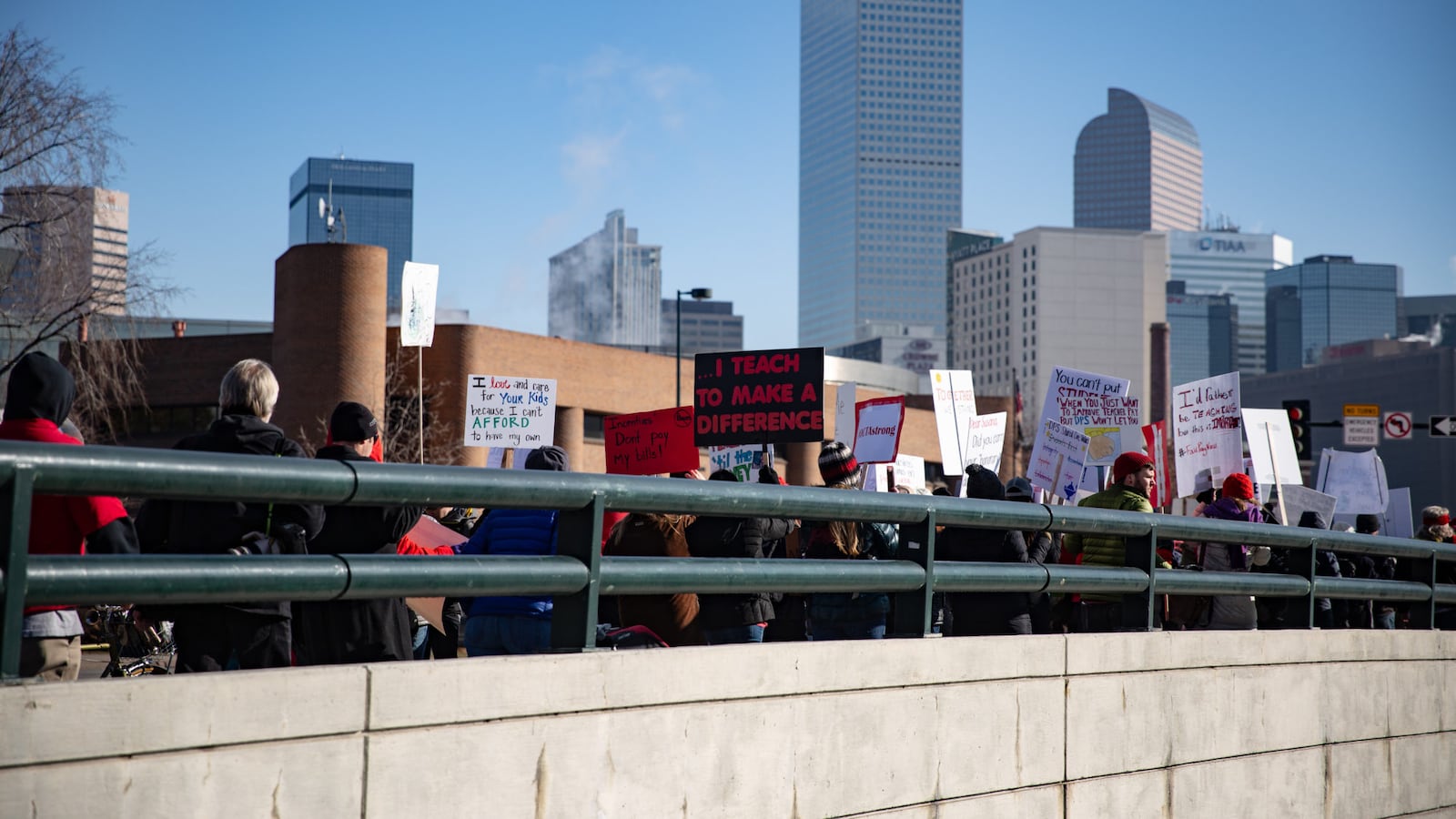Despite assurances from school district officials that they would not be reported to immigration officials for participating in the Denver strike, immigrant teachers working on visas remained in their classrooms this week instead of joining colleagues on picket lines.
Multiple sources with first-hand knowledge told Chalkbeat that some immigrant teachers are too afraid to strike. One teacher who fits that definition spoke to us on the condition of anonymity.
Any worries teachers already had about striking were inflamed when a Denver Public Schools human relations official sent an email to schools in late January saying that the district would have to report any striking teachers with H-1B and J-1 immigrant visas to immigration authorities.
After the email leaked on social media just a few days after a strike vote, district officials said it was wrong, and apologized. But to many educators, the damage had been done.
One immigrant teacher, who asked that her name and school be withheld for fear of repercussions, said she has too much at stake to take any risks.
A Venezuelan citizen who has lived in the United States for years, she is in the process of applying for residency and has young children, she said. With a political and humanitarian crisis unfolding in her home country, being forced to return is a frightening prospect.
“I would prefer to be outside” picketing, she said in an interview. “I want to make my voice heard. But it’s scary. I don’t know what could happen, and it’s my family that is at risk.”
The teacher said the first day of the strike was hard, and she struggled not to cry.
“I was here out of fear, but I wanted to be with my companions,” she said.
Of the district’s approximately 5,300 educators, 128 of them are here on H-1B and J-1 immigrant visas, the district says. But the district is not tracking whether those teachers have gone out on strike, said Anna Alejo, DPS’s chief communications officer.
Alejo said that with limited resources during the strike, the district is only tracking overall teacher attendance, student attendance, transportation staff attendance, and school meals served.
Counting how many immigrant teachers came to work or walked a picket line also would probably not help the school district regain trust and recover from its mistake.
Chalkbeat was able to confirm other examples of immigrant teachers who stayed in their classrooms this week. We are not identifying the sources of that information or the schools with the immigrant teachers because we were unable to reach the teachers to ask whether they’d be comfortable with that. By identifying the schools, we would also possibly identify them.
The immigrant teacher who spoke to Chalkbeat said she personally knows several other immigrant educators who made the same decision she did, for many of the same reasons.
“We were coerced” to not strike,” she said. “We don’t trust DPS.”
The school district tried to move quickly to limit fallout from the letter, with Superintendent Susana Cordova appearing at a news conference alongside school board members.
“This was wrong,” Cordova said then. “I cannot begin to express how shocked I was to learn of this message, and how deeply sorry I am for the anxiety and fear this has caused our educators, our families, and our community.”
Cordova said that in preparing for a potential strike, district officials asked a law firm specializing in immigrant visas whether a strike might have negative impacts on immigrant teachers, “and how we could take the appropriate steps to protect them if they choose to strike.”
The law firm advised the district it would have to notify the U.S. Department of Labor of the strike, and Cordova said that message was “misinterpreted” by human resources staff.
Cordova sent yet another email to the community about the email on Feb. 4, stating that the district needs to rebuild trust and that she had met personally with many immigrant educators. The district even set up a hotline for teachers to report immigration-based intimidation.
Alejandro Arceo, a first-year math teacher at Lake Middle School in northwest Denver, said none of those efforts could restore the trust that had been lost.
“The fact that email was first sent and it was a threat, that caused a lot of damage, regardless of the follow-up apology,” Arceo said Tuesday as he joined other striking teachers waving signs to passing motorists on Federal Boulevard. “We are talking about the livelihood of people. We are talking about the paperwork, the visa, their legal status in the country. You don’t play with those kinds of things.”


